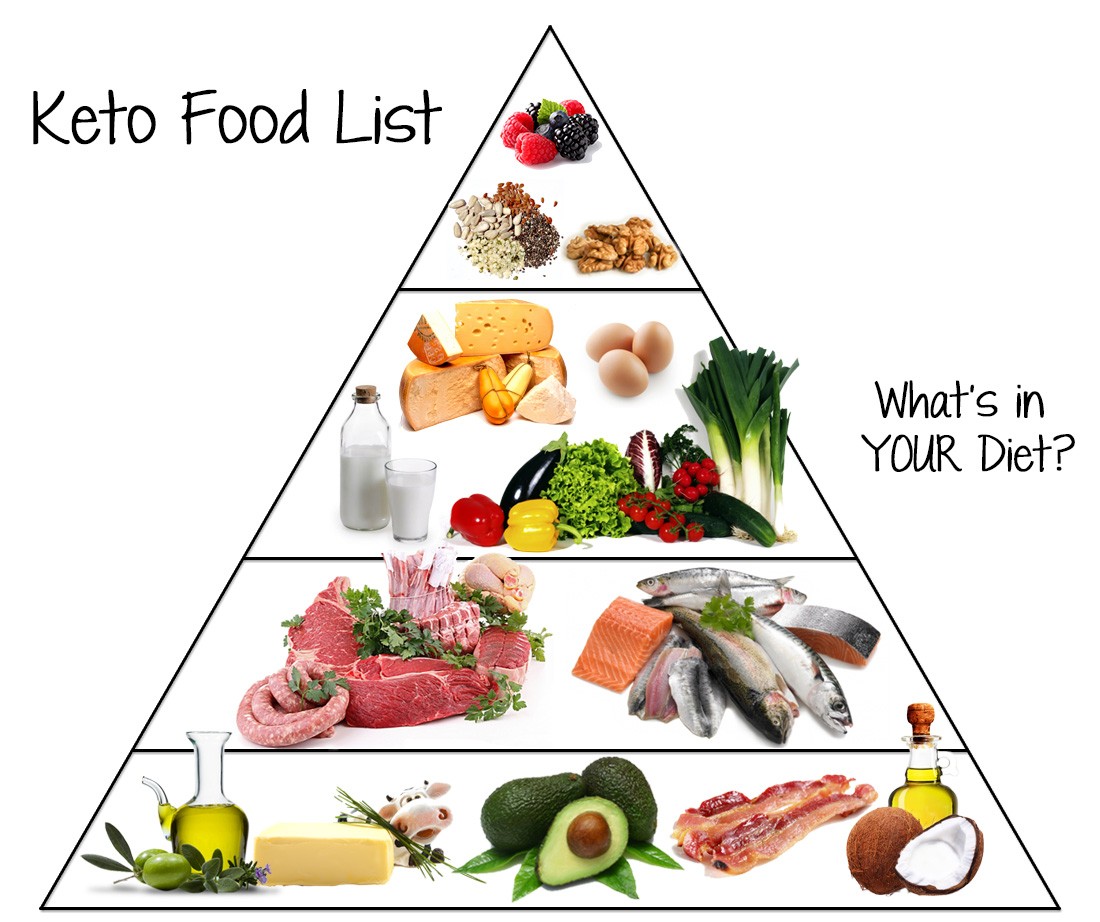For a while now I've wanted to blog about different diets. I decided the best way to do that was to immerse myself in them first and write about them after. This is diet #4.
I want to start by saying that I'm not doing any diet to lose weight. So you won't see any dramatic before and after pics here. My goal for these analysis is how do they make me feel physically and mentally. My body goal is to feel healthy and strong. I do not weigh myself regularly nor do I take my body measurements. Any weight loss I experience is not a good indicator of how much you may lose on each diet. Weight loss is extremely individual, based on your own metabolism, nutritional needs, lifestyle and activity level.
The Diet: Ketogenic diet- high fat, moderate protein, very low carb diet. Originally designed by Dr Russell Wilder at the Mayo Clinic to help treat kids with epilepsy seizures.
Ketogenic Food Pyramid
Ketosis is a change in the metabolism where the body has raised levels of ketones in the tissues. Ketone bodies are formed when the body breaks down fat to be used as energy. When your glycogen stores are depleted (rapidly available energy stored in muscle tissues) as with a low carbohydrate diet, your body uses those ketones instead of glucose as a source of energy.
The idea is to spur the body into burning stored fat instead of using carbohydrates and sugar from the diet as energy. It is designed as nutritional starvation, supplying the body with fats and protein while still mimicking starvation with extremely low carbohydrate intake to induce rapid weight loss.
This is a fad diet or a lifestyle diet. I know many people who swear by this diet and have done it for a long time. I know others that like to cycle this diet in 2 week intervals.
Duration: 2 weeks
What I ate: I wanted to do this diet without overloading on animal protein and fats. To do that and still meet my required fat and protein intakes I had to eat a lot of avocados, eggs and plant oils. I added olive oil, hemp oil and avocado oil to everything. I added butter and coconut oil to my coffee and teas. I ate a lots of salads, sprouts and steamed veggies to get enough fibre to keep me comfortable. I had shredded veggies instead of rice and spaghetti squash instead of pasta.
Just a few of my "salad bowels." Honestly they were deliscious! I would eat them again anytime.
Pros: Higher fat and protein should help you feel full longer. I rarely felt overly hungry on this diet. I loved "fat bomb" snacks I could eat anytime. I also had several compliments on my skin- honestly it looks great, no blemishes, very soft. I may continue eating an avocado a day just for that! :)
These bacon avocado breakfast muffins were one of my favourite recipes I made. Find it here: https://www.pinterest.com/pin/404409241525237267/
Low carb diets also reduce insulin resistance and greatly decrease your blood sugar levels. I greatly increased my intake of healthy plant based fats, which is great for cholesterol levels. A diet higher in healthy plant oils can also be very healing for neurological and mood disorders and diseases. It is also touted as a therapeutic diet for cancer patients as cancer cells thrive on sugars.
Cons: low fibre, the focus is on fats and proteins, so I had to really work to get enough fibre in my diet, and ended up adding some fibre supplements to keep me comfortable. Ketosis only works well for those people who are able to break down fat quickly enough to convert to energy when needed. I found that I felt really sluggish and slow after the first week. Low carbohydrates means that the muscles glycogen stores are not restored after work outs. Low glycogen stores= less energy for workouts. I also found I had some indigestion with this diet. My body was not used to having that much fat, and I used homeopathic remedies to combat the indigestion.
Kidney damage is possibly with prolonged ketosis. Even with supplementing sodium, potassium and magnesium mineral salts, I felt the skin on my arms getting quite dry by the end of the 1st week. I was drinking a lot of water and herbal teas. I was taking in so much fluids I'd wake in the middle of the night to pee, which was annoying.
It is quite socially restrictive diet, hard to find foods you can eat while out at restaurants, or at social gatherings.
In the long term low carb diets can actually slow the metabolism as the body adapts to starvation mode. It is nutrient restrictive. By cutting out most fruits and all grains, you must work harder to get all the nutrients the body needs.
Low carb diets can be detrimental to the hormones, including cortisol levels, adrenals, thyroid and estrogen and progesterone.
The Keto diet does not differentiate between healthy protein or fat sources and poor quality meat products. Processed meats are used a lot, bacon, salami etc. High quality meats can be healing, but highly processed meats contain nitrates and a lot of other chemicals that are not meant to be consumed in high amounts. Eating a lot of animal products, meats and dairy, can create inflammation in the body.
Drawbacks- you may retain water at the beginning of the diet as the fat cells like to hold water before they will dissipate. Hydration is key, not enough fluid intake can lead to the "keto flu" and headaches. You may need to add sodium to your foods to help balance all the fluid you need to take in.
Difficulty level: the difficulty level is quite high at first, though it does get easier with time. I didn't like counting carbs or protein intake. The macronutrients calculators I found were questionable in accuracy, so I played around a bit figuring out my protein/fat/carb ratios. It is very restrictive, you need to get creative and be flexible in your meal planning. I had to do a lot of prep work for this diet. I tried lots of new recipes, most of which were great.
Modifications: According to keto websites I should have kept my net carbs around 20 grams per day. In reality my net carbs were usually around 30 grams, sometimes up to 50 grams - and that's when I felt like I had more energy and was more mentally alert.
Energy level: up and down depending on how many carbs I had, lower than normal over all especially after the first week.
Weight loss: minimal
Cost: moderate; I spent more on meat, eggs, nuts and plant oils than I normally would. Supplements added to the cost as well.
Supplements: I did use some fibre supplements at the beginning to help move things along. I also took some liver support supplements and homeopathic remedies as this was higher protein diet than I would normally eat. Supplementing with magnesium, potassium and sodium is recommended. I used topical magnesium oil, added sea salt to my food and ate lots of avocados and celery to keep my potassium levels up. I also took sodium, magnesium and potassium homeopathic mineral salts.
I took some homeopathic remedies to support and protect my kidneys and gallbladder.
Recommended for: I don't recommend this diet as is for most people, especially for long term. I think just adding a high amount of plant oils into your diet would be ideal and very beneficial for a lot of people. It is very possible to do a healthy low carb diet, without the strict dietary restrictions of Keto and including more fruits and vegetables.
Not recommended for type 1 diabetics, type 2 diabetics using insulin, women who are breastfeeding, people on certain medications including diuretics and blood pressure medication. Not recommend for those with impaired kidney, liver, thyroid or adrenal function.
Rapid fat loss and extremely low carbohydrate diets can be detrimental to women's hormones. Not only will it affect fertility but it can also affect thyroid and adrenal levels. Caution should be used. People who have trouble digesting fats should avoid this diet. High fat diets are not recommended for those who have had their gallbladder removed, even with supplemental support it can be very hard on the body.
Bottom line: I really wanted to like this diet. I know it's very popular right now, and I know many people who love it. However to me it is just another fad diet. There are too many things you need to be cautious of following this diet. It's very restrictive, hard to follow when eating away from home. Anytime you eat too many carbs you need to restart ketogenisis and start over. Eating a high fat diet with even moderate carbs can lead to weight gain. Hormone balance is a big concern for me as is possible kidney damage. The severe carbohydrate restriction was the biggest issue for me. I can't recommend this diet.
I'm not good at following rules, I'd rather make my own. So here's the Changes I would make: Some suggest a cyclical keto diet, 5 days on, 2 days of carb loading. I didn't try this, but I think it may be better suited for people like me who do work out frequently. Others adapt it to a paleo keto diet blend with more complex carbohydrates allowed. This is one I would consider less harmful as the carb count is not nearly as restricted which does not stress the body as much.
In the spirit of full disclosure I want to include my constants: I drink 1 cup of organic coffee each morning as well as greens powder in water with 1 tbsp AVC and 1 cup of lemon water. I take my homeopathic remedies as needed. I strive to do cardio 3-5 days per week, and weight or resistance training 4-6 days per week. These are just my normal routine and I did not change these for this diet. I did not weigh myself regularly nor did I take measurements. Any weight loss I experienced is not a good indicator of how much you may lose on each diet. Weight loss is extremely individual, based on your own metabolism, nutritional needs, lifestyle and activity level.
I hope you have found this information helpful. My goal is to share information to educate and empower people to take control of their own health. Please contact Lisa for more information. I would love to help you experience Better Health Naturally!
The information provided here is for educational purposes only. For treatment please seek a qualified health care provider.
Next up: Juice fasting
Copyright Lisa Paul The Natural Path 2017




